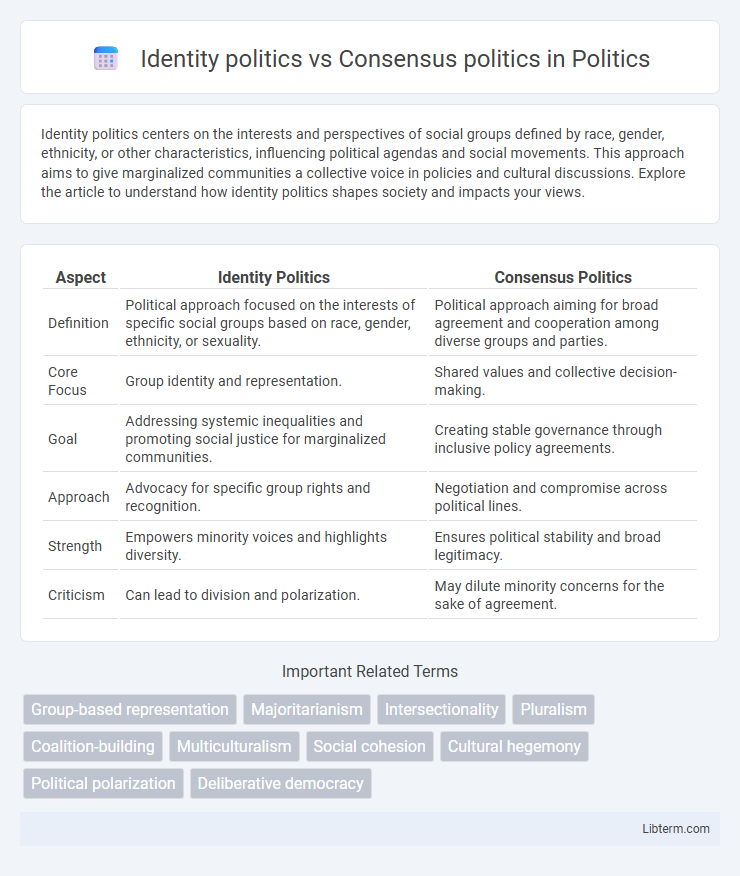Identity politics centers on the interests and perspectives of social groups defined by race, gender, ethnicity, or other characteristics, influencing political agendas and social movements. This approach aims to give marginalized communities a collective voice in policies and cultural discussions. Explore the article to understand how identity politics shapes society and impacts your views.
Table of Comparison
| Aspect | Identity Politics | Consensus Politics |
|---|---|---|
| Definition | Political approach focused on the interests of specific social groups based on race, gender, ethnicity, or sexuality. | Political approach aiming for broad agreement and cooperation among diverse groups and parties. |
| Core Focus | Group identity and representation. | Shared values and collective decision-making. |
| Goal | Addressing systemic inequalities and promoting social justice for marginalized communities. | Creating stable governance through inclusive policy agreements. |
| Approach | Advocacy for specific group rights and recognition. | Negotiation and compromise across political lines. |
| Strength | Empowers minority voices and highlights diversity. | Ensures political stability and broad legitimacy. |
| Criticism | Can lead to division and polarization. | May dilute minority concerns for the sake of agreement. |
Understanding Identity Politics
Identity politics centers on advocating for the unique interests and rights of specific social groups based on race, ethnicity, gender, or sexual orientation, emphasizing lived experiences and systemic inequalities. This approach contrasts with consensus politics, which seeks broad agreement across diverse groups by prioritizing common goals over distinct identities. Understanding identity politics requires recognizing its role in amplifying marginalized voices and challenging dominant power structures through coalition-building among shared identity groups.
Defining Consensus Politics
Consensus politics emphasizes broad agreement and collaborative decision-making among diverse political groups, seeking common ground to maintain social stability and effective governance. It prioritizes inclusive dialogue and compromise, aiming to balance competing interests without deepening societal divisions. This approach contrasts with identity politics, which centers on representing specific group interests and often highlights differences rather than shared goals.
Historical Origins of Both Approaches
Identity politics emerged prominently during the civil rights movements of the 1960s and 1970s, rooted in marginalized groups seeking recognition and rights based on race, gender, sexuality, and ethnicity. Consensus politics, by contrast, has origins in post-World War II democratic governance, emphasizing broad agreement, compromise, and social cohesion to maintain stability within diverse societies. While identity politics centers on distinct group identities and social justice, consensus politics prioritizes collective decision-making and policy moderation.
Key Principles of Identity Politics
Identity politics centers on recognizing and advocating for the unique experiences and rights of marginalized groups based on race, gender, sexuality, and other social categories. Core principles include valuing lived experiences, emphasizing group-specific justice, and challenging dominant cultural norms and systemic inequalities. This approach contrasts with consensus politics, which seeks broad agreement and compromise across diverse groups by prioritizing shared values and collective goals.
Core Values of Consensus Politics
Consensus politics centers on shared core values such as mutual respect, inclusivity, pragmatism, and a commitment to democratic processes that prioritize collective well-being over individual group interests. It emphasizes finding common ground across diverse perspectives to foster social cohesion and policy stability. This approach contrasts with identity politics by advocating for broad-based cooperation and compromise to address societal challenges effectively.
Impact on Policy-Making
Identity politics shapes policy-making by prioritizing the unique needs and rights of specific social groups, often resulting in targeted legislation on issues such as racial justice, gender equality, and LGBTQ+ rights. Consensus politics fosters collaboration among diverse stakeholders, promoting broadly supported policies that emphasize compromise and social cohesion, which can lead to more stable and inclusive governance. The tension between these approaches influences the direction and effectiveness of policies addressing social equity, economic development, and civil rights.
Representation and Inclusivity
Identity politics centers on representing specific social groups based on race, gender, or ethnicity to address historical inequalities, ensuring marginalized voices are included in political discourse. Consensus politics emphasizes broad-based cooperation and compromise across diverse groups to achieve collective decision-making and policy inclusivity. Balancing identity politics with consensus politics can improve representation by recognizing distinct group needs while fostering social cohesion and inclusive governance.
Social Cohesion vs. Group Division
Identity politics often emphasizes the distinct experiences and rights of specific social groups, which can strengthen group identity but also lead to social fragmentation and reduced cohesion. Consensus politics seeks common ground and shared values, promoting social unity and collective problem-solving across diverse communities. Balancing these approaches is crucial for fostering both recognition of group differences and broader societal integration.
Criticisms and Controversies
Identity politics often faces criticism for promoting division by emphasizing group differences and potentially marginalizing broader societal interests, leading to fragmented political landscapes. Consensus politics is criticized for prioritizing agreement at the expense of minority voices, sometimes resulting in diluted policies that fail to address urgent social injustices. Controversies arise when identity politics challenges established norms, while consensus politics is seen as perpetuating the status quo, highlighting a persistent tension between representation and unity.
Future Trends in Political Strategies
Future trends in political strategies indicate a shift towards hybrid models blending identity politics with consensus politics to address increasingly diverse electorates. Data-driven approaches and digital campaigning tools enable tailored messaging that appeals to specific demographic groups while fostering broader coalitions through common policy goals. Political parties are expected to prioritize inclusive narratives and intersectional frameworks to navigate social complexities and enhance voter engagement.
Identity politics Infographic

 libterm.com
libterm.com